How to Survive a Tornado
Tornadoes are powerful and destructive storms that can cause serious damage and injury. Knowing how to prepare for a tornado and what to do during one can help keep you safe. This article will provide tips on how to survive a tornado, including what to do before, during, and after the storm. If you have knowledge that a tornado is heading your way, you should get into the safest location possible. Tornado Watch vs Tornado Warning
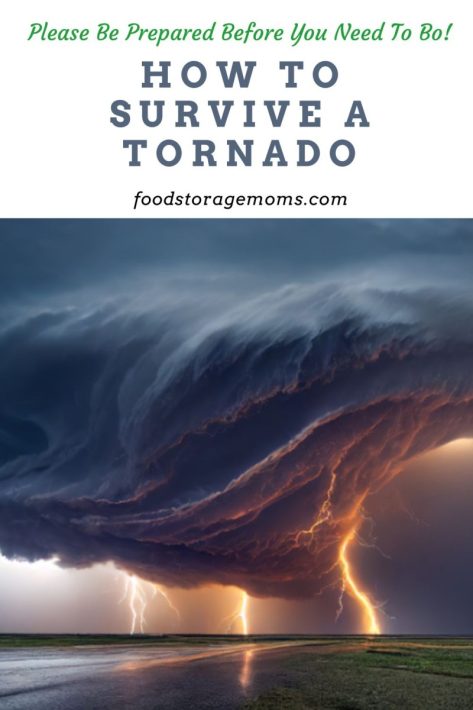
Before a Tornado
The best way to ensure your safety during a tornado is to be prepared ahead of time. Here are some steps you should take before a tornado strikes:
- Know the signs of an approaching tornado. Look for dark, rotating clouds, large hail, or loud roaring noises like an approaching freight train. Most tornados start out as strong thunderstorms in your area, so be sure to stay alert in your watch area.
- Have an emergency communication plan in place. Make sure everyone in your household knows where to go if a tornado is approaching and how they will stay in contact with each other.
- Have an emergency kit ready with supplies such as food, water, first aid supplies, flashlights, batteries, and any necessary medications.
- Identify the safest areas of your home or building where you can take shelter if needed. Basements or interior rooms on the lowest floor are usually the safest places. If you have a storm cellar you are one of the lucky ones when looking for a safe place to hunker down.
- Stay informed about weather conditions by listening to local news broadcasts or downloading weather apps on your phone that provide alerts when severe weather is approaching. I like having a hand crank radio and one where you receive weather updates.
- Always pay attention to any advance warning and don’t take it lightly. Emergency alerts do save lives.
- Ensure you have an emergency preparedness kit read. This includes a first-aid kit, medical supplies, and any other basic items you may need.
- If you live in any of the mobile home communities, you should always be prepared to go to a safe room, storm shelter, or a sturdy building recommended by local authorities.
During a Tornado
If you find yourself in the path of a tornado there are certain steps you should take:
- If possible, move quickly but carefully into the designated safe area of your home or building. Close all doors behind you and cover windows with blankets or towels if available.
- Lie flat on the floor under sturdy furniture such as tables or desks for protection from flying debris and broken glass.
- Cover your head with pillows or blankets for additional protection from flying debris and broken glass.
- Stay away from windows and exterior walls as much as possible until the storm has passed.
- Get on the lowest level of the floors of your home, this is vital for tornado survival and tornado safety.
After a Tornado
Once the storm has passed it is important to remain vigilant as there may still be danger present:
- Do not attempt to leave your shelter until it is safe outside. Wait until local authorities have declared it safe before leaving your shelter area.
- Be aware of downed power lines which may still be live, avoid them at all costs.
- Check yourself for injuries, and seek medical attention if needed.
- Wear protective clothing such as long pants, long sleeves, gloves, and boots when inspecting damage.
Following these tips can help ensure that you stay safe during a tornado event. Being prepared ahead of time can make all the difference in ensuring that you survive this potentially deadly storm.
What else can I do to be prepared for a tornado?
- Listen to the NOAA Weather Radio station(s)
- Pay attention to the National Weather Service.
- Have an emergency communications plan in place.
- Pay attention to the signs of a tornado during tornado season.
- Follow local officials on social media so you can be prepared for heavy rain, severe storms, funnel cloud, or a tornado warning.
- Have a tornado emergency plan in place.
Is it possible to survive a tornado?
Yes, it’s possible to survive a tornado. While tornadoes can be incredibly powerful and destructive, there are steps you can take to increase your chances of survival.
The key to surviving a tornado is being prepared ahead of time. This includes having an emergency plan in place, identifying safe areas of your home or building where you can take shelter, and having emergency supplies on hand. It’s also important to stay informed about weather conditions and to heed any warnings or watches issued by local authorities. These agencies have access to weather radar that can tell the size, direction, speed of travel, and other tornado reporting issues. If your area has tornado sirens, be sure to take cover once you hear the siren, if you haven’t already.
During a tornado, the safest place to be is usually in a basement or interior room on the lowest floor of a building, which may even be a bathroom or interior hallway. If you don’t have access to a basement, try to find a small interior room or closet without windows. Cover yourself with pillows, blankets, or mattresses for additional protection from flying debris.
While tornadoes can be very dangerous, taking these steps can help increase your chances of survival. It’s important to remain vigilant and follow safety guidelines to ensure that you stay safe during a tornado event.
- How to Survive in a Stranded Car During Winter
- First Aid Kits-What You Need To Survive
- 15 Ways to Survive a Depression
How to Stay Calm During a Tornado
- Take deep breaths to help calm your nerves and slow your heart rate.
- Focus on the present moment and what you need to do to stay safe.
- Remind yourself that you have prepared for this event and you know what to do.
- Stay away from social media or unreliable news updates that can increase anxiety and panic.
- Use grounding techniques such as counting or reciting a calming mantra to help center yourself.
- Reassure others around you, especially children, and encourage them to stay calm and follow safety guidelines.
- Stay positive and trust in your ability to handle the situation.
- Consider using relaxation techniques such as visualization or progressive muscle relaxation to help reduce stress.
What do I do with my windows during a tornado?
Some people have the misconception that they should open windows in their homes to help equalize the air pressure from the columns of air during a tornado. This not only is a waste of precious time but can prove to be very dangerous. The tornado can generate winds from 65 mph to over 300 mph. At that speed, the winds hitting your home can be so forceful that flying debris is a real issue. Stay away from those windows and keep them closed!
If I have to leave my home, should I look for a ditch to hide in for protection?
Your home or storm shelter are generally the safest haven during a tornado, but if you do have to leave your home for any reason a ditch MAY be a safer place to decrease your exposure to very high winds and being trapped in a collapsed building, but it won’t protect you very well from any flying debris.
More Natural Disasters Tips
- Should We Rebuild After Natural Disasters?
- 12 Types of Natural Disasters
- How to Prep for Industrial Disasters
Final Word
Learning how to survive a tornado is quite overwhelming. However, in order to help yourself know how to survive something like this, you need to have the proper knowledge. Have you ever had a close run-in with a tornado? I would love to hear all about your experiences. May God Bless this world, Linda
Copyright Images: Tornado Storm AdobeStock_538139507 By waichi2013th

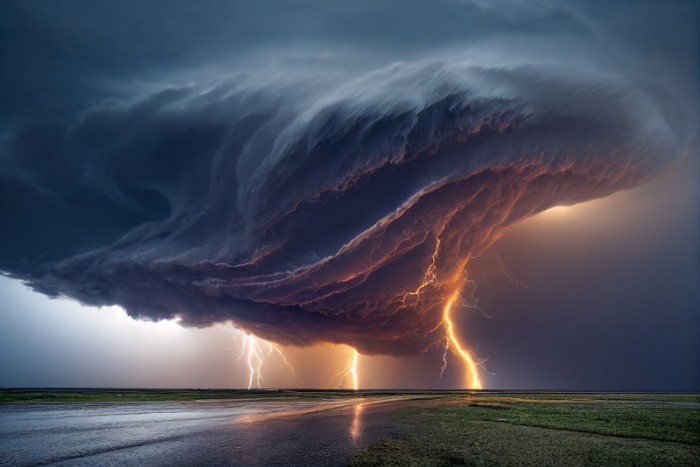


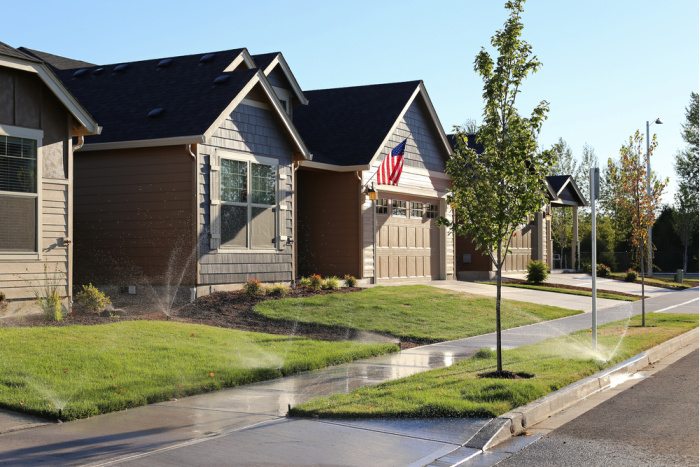
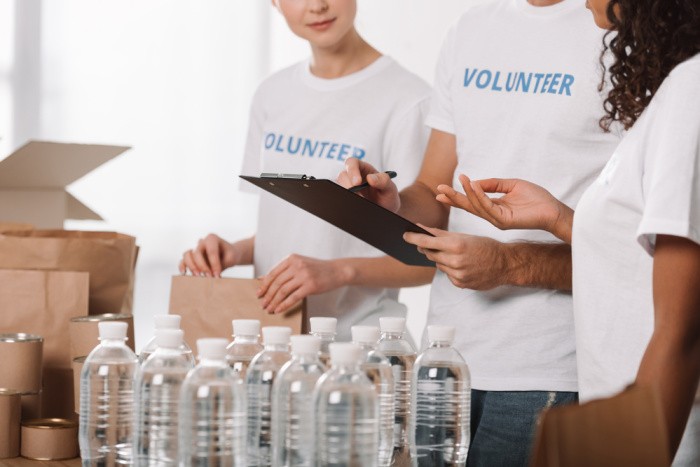
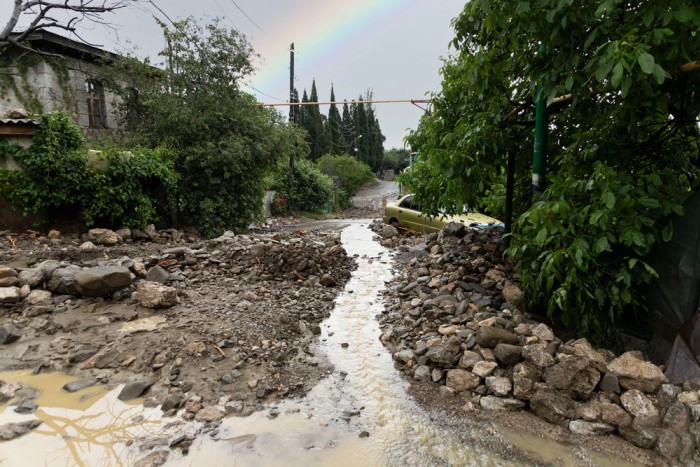
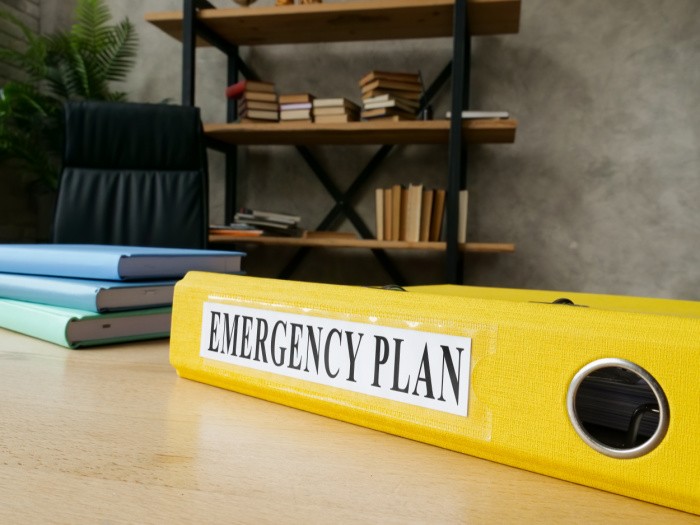
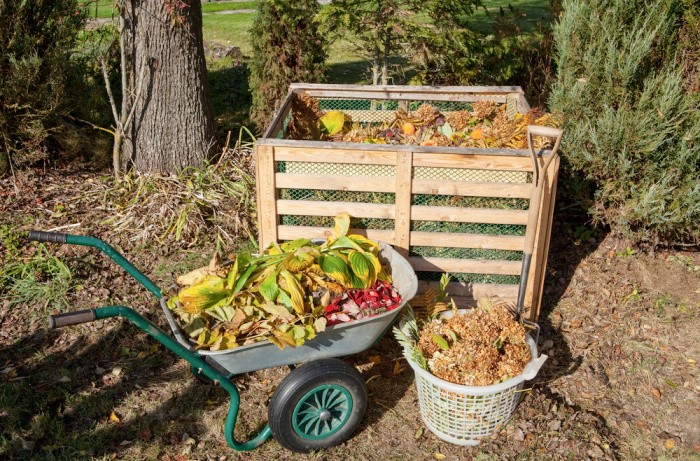













Signs are also a green tint to the sky and winds suddenly dying.
Do not be afraid of the mud in a ditch or any structures that’ll get you low. You’ll wash if you live.
If you own body armor this is a real good time to use it. Safety glasses, bike helmets etc as well.
Prepare yourself for PTSD and those with it as well
as those being in shock afterwards. Friend of ours got hit so we went to help recovery property and see to them. His wife was cleaning the hardwood floor. Had it clean as can be. Sounds ok but they had no roof. She was in shock and breaking down.
If you’ve got med kits bring them. If your driving into the zone afterwards being a tire repair kit.
HI Matt, thank you for sharing this comment, it brings reality to all of us. The tips you shared are so helpful. The PTSD would be horrendous, thank again for sharing what really happens after a tornado. Linda
I have lived through 2 tornadoes although I don’t remember the first one. I was only 2 years old when a tornado tore through our small town. Mom put me and my new-born sister under the bed; we had no storm shelter at that time. The tornado passed by close and we were fortunate there was no damage to our house. The second one I was only a mile away from it. I had gone to pick up my mom because it was being tracked close to where she lived. Fortunately, her home wasn’t damaged but she was without electricity for 2 weeks. It was a good thing I went to get her as there was damage in her area and law enforcement had roads closed. It was too far for her to walk out of.
Hi Paula, oh wow, that a blessing you had gone to pick her up. I have only been through one tornado and we all went to the basement. We were fine but the home next door lost it’s roof, and the headstones at the cemetery across the street were toppled over and broken to bits. Linda
Linda, there were fatalities in both of those tornadoes. My parents had friends who died in the first one. This was before we had tornado sirens. Hard to believe that every town in Kansas wouldn’t have sirens, but this was in the late 50’s.
Hi Paula, oh that’s rough, to lose friends during or after the tornadoes. Most cities learn from mistakes, or at least some do. Linda
As a kid in Kansas I lost two homes to tornadoes. The first belonged to my maternal grandparents. Fortunately they had a storm shelter. That one hit on a pitch black night and this was well before there were NOAA broadcasts. There’s a feel to the air before one hits. I’ll bet Matt knows that feeling. Anyhow, we got to the shelter with seconds to spare. Heard the shrieking of nails being pulled from wood and Grandpa looked at Grandma and said, “Well, there goes the house.”
The other was when I was 8 and was looking out for my little brother while my mom and dad went out to get dinner. We lived on the second floor of a brick apartment building. When the warning sirens went off I got Wayne into the bathtub and we pulled a mattress over us. The tornado ripped the front of the building and the roof clean off. We had to push our way out of the debris as several bricks landed on the mattress. By the time my parents got back we were playing on a pile of bricks–and they go to us before the first responders arrived.
Awareness is the key to surviving such a storm, though luck definitely played a part. Have an emergency radio and USE it.
If you do not have a storm cellar or basement, get to a central room that hopefully does not have outside walls or windows. Hall closets and bathrooms can do the trick.
Oh, and if you’re out on the road and see one coming do NOT park under an overpass. The Venturi effect can suck people and vehicles out into the storm. Your are better off to drive away from the tornado.
Hi Ray, thanks for sharing the story about you and your brother, what a blessing you knew what to do at 8 years of age. You are so right about awareness, and we must have a NOAA radio with good batteries in case all the power goes out we hopefully hear what’s going on if the sirens are not in our town. Great comment, I love it! Linda
Good to know when any natural disaster hits. PTSD is very real!! When we had a major flood here in 1996 it took weeks for people to get back to “normal”. So much had to be be done afterwards. We had no power for over 2 weeks and the mud in our yard took weeks to dry out, as well. Helping others is so important!!
Hi Cheryl, oh you are so right! We need people to help one another and it will take weeks if not month to get back to “normal”. Linda
I have been lucky. I have lived in Ohio, Illinois, Massachusetts, Tennessee and now New Mexico. Never saw a tornado. Don’t know if it was dumb luck but I prefer to think it was God’s Hands protecting me and my family
Hi Jackie, oh all of the above, you are blessed to have not experienced one! I love it! Linda
Two things from someone who has not been through a tornado, but has been through several big earthquakes…
A counselor told us that while the shaking is going on, if you repeat aloud something like “Stop Now” over and over, when the shaking stops, you will have less ptsd as your brain thinks you had some control in stopping it.
Also about the breathing– do not remember where I heard it first, but if you breathe in counts of four– four in, hold for four, for out, hold for four, repeat, this is supposed to signal your brain that all is well and you are safe. It does seem to help with clearer thinking in stressful situations!
Thanks for all you do! Stay safe and God bless!
“HI Jan, oh I’m so glad you mentioned this about breathing and the earthquake “Stop Now”. I remember being told about breathing as well to help with anxiety and stressful situations. Great comment, we need to be prepared with our mental health for sure. Thank you, Linda
Thank you so much Linda and all of you who commented with helpfulness!
HI Lillace, thank you for your kind words, we really do have so many wonderful people in our comment forum. Linda